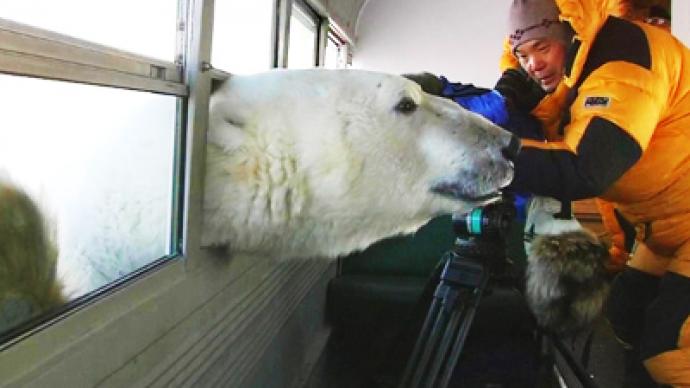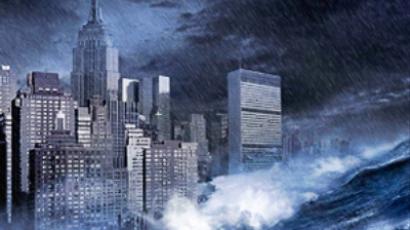Russia gives NATO cold shoulder on Arctic militarization

As the race to lay claim to the Arctic region and its huge oil reserves heats up, Russia tells the Western military bloc that its presence is not required.
With Prime Minister Vladimir Putin expected to take part in an international forum devoted to the subject of Arctic transport routes, Russian special envoy Anton Vasilyev says that there are no problems in the Arctic to which a military presence would be a solution."Problems do exist in the Arctic, but we have no questions there which would require military force. We do not need the presence of military-political blocs in the Arctic," the diplomat said in an interview with Interfax.Vasilyev rebuked claims that one of the coldest spots on the planet is being militarized."Some (observers) are writing about an arms race allegedly occurring in the Arctic. But, mildly speaking, this is an exaggeration, in my opinion," he said.While agreeing that the Arctic states – comprised of Canada, Denmark (by way of Greenland), Norway, Russia and the United States – have been paying more attention to their military presence in the region, Vasilyev said the military build-up is not large-scale and should not cause alarm. "It is a logical and natural occurrence, in my opinion. It is of limited scope and is not a factor of instability, or a symptom of an arms race. We are talking about conventional armaments in the Arctic," the diplomat told Interfax.It should be noted that all of the Arctic countries except Russia are NATO members.Meanwhile, Vasilyev emphasized that the Arctic must be declared a nuclear-free zone, but then went on to say that NATO’s nuclear doctrine could present certain difficulties."In principle, we support the idea of a nuclear-free zone,” the special envoy said. “It is one of the most important instruments for spreading the regime of nonproliferation of nuclear weapons in the world.”Vasilyev, raising the question of the Arctic’s non-military stature, went on to ask how Russia should respond to a situation when the other Arctic states, as full-fledged NATO members, are bound to comply with the military bloc’s nuclear doctrine.“How can this idea be organized, specifically in the Arctic, where, alongside Russia, NATO countries are present and each of them is bound by NATO's nuclear doctrine? This is a big issue," he said.The Russian diplomat went on to mention that Prime Minister Vladimir Putin is expected to take part in a international forum, entitled “Arctic a Territory of Dialogue,” which begins in the Far North Russian city of Arkhangelsk on Thursday.Putin addressed the first forum, which was held in Moscow in September 2010.This year’s forum will focus on the development of transport routes in the Arctic region, noted Vasilyev, who also represents Russia in the Arctic Council. “We will discuss all issues. But transport routes, first of all the Northern Sea Route, will be given priority," he said.In the opinion of other members of the Arctic Council, which also includes the United States, Canada, Denmark, Iceland, Norway, Sweden and Finland, the Moscow forum was very successful, Vasilyev said. "This forum gained respect very soon and Russia asserted its reputation of leader in the Arctic region, which is not surprising. After all, half of the Arctic region is Russia," he said.Vasilyev reiterated the forum’s central concept, which is to "exchange information and views on development trends in the region, to establish contacts between people and, most importantly, to exchange ideas about how the Arctic region can be developed in co-operation.”On the question of addressing Russia’s right to expand the borders of the Arctic continental shelf with the UN, the special envoy said Russia is still collecting the necessary scientific data to forward its claim."It's difficult to say exactly when we will submit this bid to the UN Commission on the Limits of the Continental Shelf and when it will make the decision. First, we must get the entire package of scientific data and, second, we must process these data into concrete terms and formulas, and convince the Commission that we are right. We are sure we will manage to do this," he said.“But we will not have the sovereign right to lay cables or pipelines in this territory," Vasilyev stressed.On August 2, 2007, a Russian expedition led by Artur Chilingarov, an explorer and member of the State Duma, made history when they successfully descended to the floor of the North Pole in a submersible vehicle. There, the team took soil and water samples, and even planted a titanium Russian flag on the seabed for posterity.The mission went a long way towards proving that the eastern section of seabed known as the Lomonosov Ridge is in fact an extension of Russia's landmass.If the claim is verified, "Russia will be able to increase its continental shelf by 1.2 million square kilometers [460,000 square miles] with potential hydrocarbon reserves of not less than 9,000 to 10,000 billion tonnes of conventional fuel beyond the 200-mile [322 kilometer] economic zone in the Arctic Ocean," Viktor Posyolov, an official with Russia's Agency for Management of Mineral Resources, told Itar-Tass.Russian Foreign Minister Sergey Lavrov told reporters: "The aim of this expedition is not to stake Russia's claim but to show that our shelf reaches to the North Pole."Robert Bridge, RT













